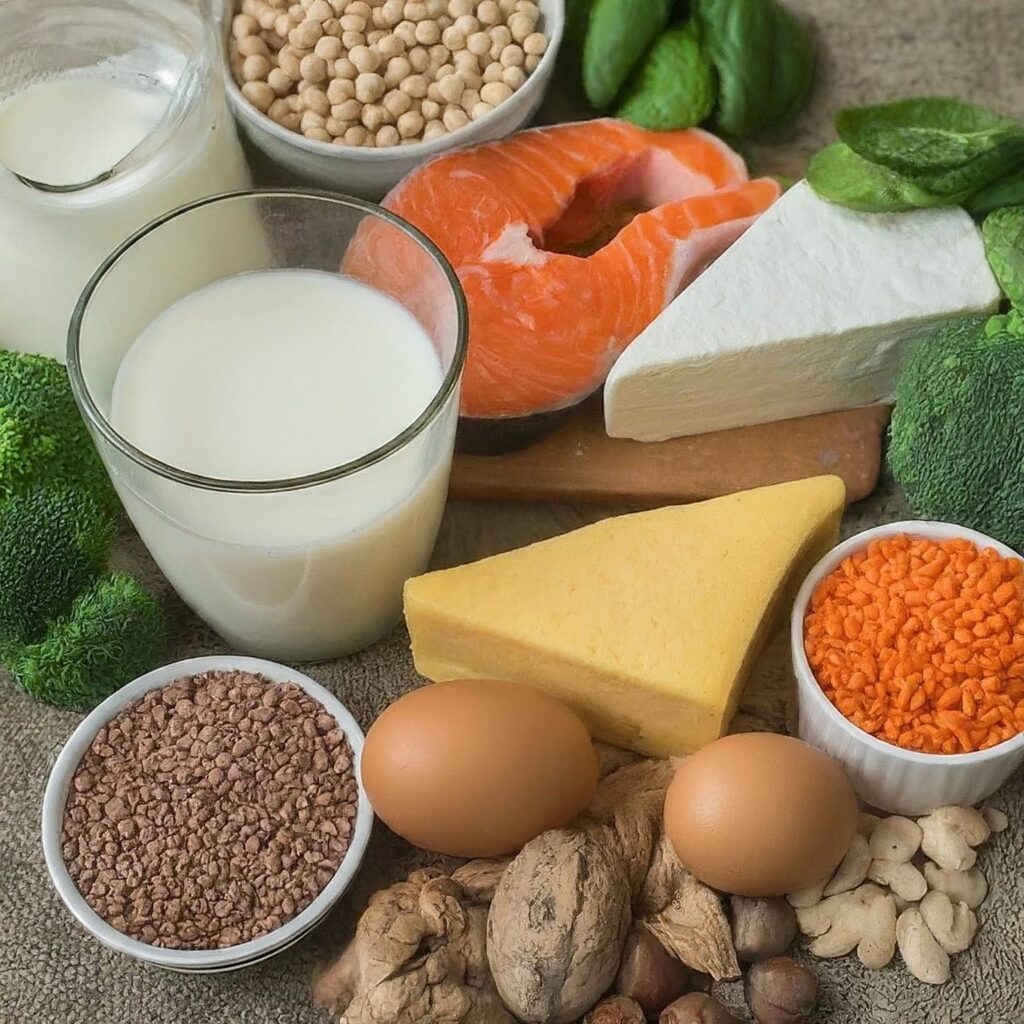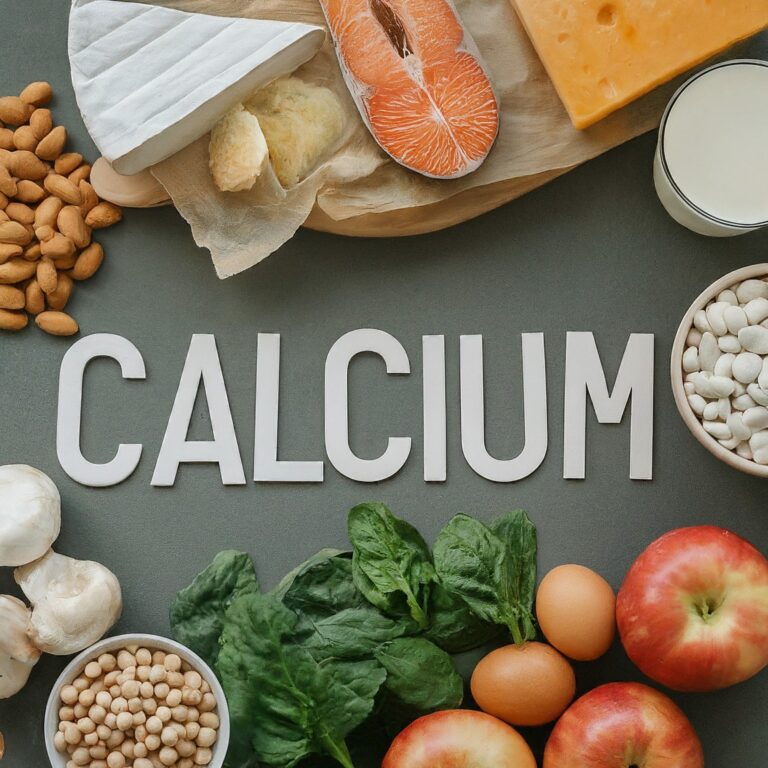Calcium is often known for the bone health, but its significance extends far beyond that. It is a important mineral that the body needs for several vital functions. Whether it’s enabling your muscles to contract or ensuring your heart beats rhythmically, it is so much important. Despite its importance, many people still fall short of the recommended daily intake, leading to potential health issues. In this article, we’ll explore the top 10 foods rich in calcium and know why it is so important for your overall well-being.
Why is Calcium So Important ?
Calcium is the most abundant mineral in the human body, with 99% stored in bones and teeth. The remaining 1% plays a vital role in critical physiological processes. This mineral is essential from infancy through old age, making it a lifelong necessity. Here’s why it is so important:
- Bone Health and Development: It is integral to the development and maintenance of strong bones. In children and adolescents, adequate calcium intake is crucial for achieving peak bone mass. For adults, especially women post-menopause, calcium helps maintain bone density and reduces the risk of osteoporosis and fractures.
- Muscle Contraction and Relaxation: Every time you move a muscle, whether it’s lifting a cup of coffee or walking up the stairs, it is at work. It interacts with proteins within muscle cells, allowing them to contract and then relax. Without enough calcium, muscles may experience spasms or cramps.
- Nerve Function: It is a key player in transmitting messages between your brain and every part of your body. It enables nerve cells to send signals efficiently, which is essential for reflexes, coordination, and overall nervous system function.
- Blood Clotting: It plays a critical role in the blood clotting process. When you sustain a cut or injury, calcium aids in converting prothrombin into thrombin, an enzyme that facilitates the formation of a blood clot, stopping the bleeding.
- Cellular Functions and Hormone Secretion: It is involved in the release of hormones and enzymes that are necessary for a variety of bodily functions. It acts as a signaling molecule within cells, influencing processes like metabolism and digestion.
- Heart Health: It’s role in muscle contraction extends to the heart muscle. The mineral helps regulate the heart’s rhythm, ensuring that it beats in a steady, controlled manner. This is why severe calcium deficiency can sometimes lead to heart arrhythmias.
Understanding Calcium Deficiency
Despite the abundance of calcium in many foods, it’s deficiency is not uncommon, especially in certain populations. Hypocalcemia, or low levels of calcium in the blood, can lead to a host of health issues. The consequences of not getting enough calcium can be severe and long-lasting.
Common Problems Associated with Calcium Deficiency
- Osteoporosis and Bone Fractures: Osteoporosis, a condition characterized by brittle and fragile bones, is a common consequence of long-term calcium deficiency. This condition increases the risk of fractures, which can be particularly problematic in older adults.
- Muscle Cramps and Spasms: It is essential for muscle function, and a deficiency can lead to painful muscle cramps and spasms, particularly in the legs. These cramps are often a sign that your muscles are not receiving the calcium they need to function properly.
- Dental Issues: Teeth, like bones, require calcium to stay strong. A lack of calcium can lead to weak teeth, increasing the risk of cavities, tooth decay, and periodontal disease.
- Chronic Fatigue: It plays a role in energy production. Without sufficient calcium, you may experience persistent fatigue, low energy levels, and overall weakness, making it difficult to perform daily activities.
- Numbness and Tingling: It is crucial for nerve function. Low calcium levels can impair nerve communication, leading to numbness and tingling sensations, particularly in the hands, feet, and face.
- Severe Deficiency Risks: In extreme cases, calcium deficiency can lead to more severe symptoms like seizures, heart arrhythmias, and even death. While these are rare, they highlight the importance of maintaining adequate calcium levels.
Top 10 Calcium-Rich Foods to Include in Your Diet

Incorporating calcium-rich foods into your diet is the best way to ensure you’re meeting your body’s needs. Below, I have compiled a list of the top 10 foods that are not only rich in calcium but also offer additional health benefits.
1. Dairy Products: The Classic Source
Dairy products like milk, cheese, and yogurt are among the most well-known sources of calcium. A single cup of milk contains around 300 mg of calcium, accounting for nearly 30% of the daily recommended intake for most adults. Cheese, particularly hard varieties like Parmesan, is also rich in calcium. Yogurt not only provides calcium but is also a good source of probiotics, which support gut health. For those who are lactose intolerant, lactose-free versions are available, which offer the same benefits without the digestive discomfort.
2. Leafy Green Vegetables: A Plant-Based Powerhouse
Kale, spinach, and collard greens are excellent plant-based sources of calcium. While dairy often steals the spotlight, these leafy greens are a fantastic alternative, especially for those following a vegan or vegetarian diet. One cup of cooked collard greens provides around 266 mg of calcium, making it a substantial contributor to your daily intake. Additionally, these vegetables are packed with other essential nutrients like vitamin K, which plays a role in bone health by regulating calcium in the body and supporting bone mineralization.
3. Almonds: Nutritious and Calcium-Rich
Almonds are a great snack that’s also packed with calcium. An ounce of almonds, roughly a handful, contains about 76 mg of calcium. Beyond calcium, almonds are rich in healthy fats, fiber, and protein, making them a heart-healthy snack that also supports weight management. They are also high in magnesium, which is essential for the absorption and metabolism of calcium.
4. Sardines: Tiny Fish with Big Benefits
Sardines are often overlooked, but they are one of the most nutrient-dense foods you can eat. A 3.75-ounce can of sardines provides about 325 mg of calcium, which is more than a cup of milk! These small fish are also rich in omega-3 fatty acids, which support heart health, and vitamin D, which enhances calcium absorption. Sardines are particularly beneficial because they include the bones, which are softened during the canning process and are a rich source of calcium.
5. Fortified Foods: A Modern Solution
In today’s world, many foods are fortified with calcium, making it easier than ever to meet your daily needs. Fortified orange juice, cereals, and plant-based milks like almond, soy, or rice milk are all excellent options. For instance, a cup of fortified orange juice can provide up to 350 mg of calcium. Fortified foods are especially useful for those who avoid dairy or have dietary restrictions, offering a convenient way to ensure adequate calcium intake.
6. Tofu: The Vegan’s Best Friend
Tofu is a nutrient-rich food that’s particularly popular among vegetarians and vegans. Half a cup of tofu can contain between 200-400 mg of calcium, depending on how it’s prepared. Tofu is also an excellent source of plant-based protein and is low in calories, making it a great addition to any diet. Furthermore, tofu can be easily incorporated into a variety of dishes, from stir-fries to smoothies, providing a substantial calcium boost.
7. Chia Seeds: Tiny but Mighty
Chia seeds may be small, but they pack a punch when it comes to calcium content. Two tablespoons of chia seeds provide around 179 mg of calcium. These tiny seeds are also a fantastic source of omega-3 fatty acids, fiber, and antioxidants, making them a true superfood. Chia seeds are incredibly versatile and can be added to smoothies, oatmeal, or yogurt, or used to make chia pudding—a nutritious and calcium-rich dessert.
8. Broccoli: A Green Vegetable Staple
Broccoli is a common vegetable in many households, and it’s also a good source of calcium. One cup of cooked broccoli contains about 62 mg of calcium. While it may not be as calcium-dense as some other foods on this list, broccoli offers a variety of other health benefits. It’s rich in vitamins C and K, as well as folate and fiber, all of which support overall health and well-being. Broccoli is also known for its cancer-fighting properties, thanks to its high levels of sulforaphane.
9. Figs: A Sweet and Nutritious Snack
Dried figs are not only sweet and satisfying but also packed with calcium. A half-cup of dried figs contains around 120 mg of calcium, making them a delicious way to boost your calcium intake. Figs are also high in fiber, which supports digestive health, and antioxidants, which protect your cells from damage. Whether eaten on their own or added to salads and desserts, figs are a versatile and nutritious addition to your diet.
10. Sesame Seeds: Small Seeds with Big Benefits
Sesame seeds may be small, but they’re rich in calcium. One tablespoon of sesame seeds contains about 88 mg of calcium. These seeds are also high in copper, magnesium, and iron, which support various bodily functions, including bone health and immune function. Sesame seeds can be sprinkled on salads, added to baked goods, or used to make tahini—a creamy paste that’s a key ingredient in hummus.
The Importance of Pairing Calcium with Other Nutrients
While calcium is crucial, it doesn’t work in isolation. For your body to absorb and utilize calcium effectively, it needs to be paired with other essential nutrients.
1. Vitamin D
Vitamin D is perhaps the most important nutrient to pair with calcium. It enhances calcium absorption in the gut, helping to maintain proper calcium levels in the blood. Without enough vitamin D, your body can’t absorb the calcium you consume, no matter how much you eat. Foods like fatty fish, fortified dairy products, and exposure to sunlight can help you get enough vitamin D.
2. Magnesium
Magnesium plays a complementary role to calcium, particularly in muscle function. While calcium stimulates muscle contraction, magnesium is responsible for muscle relaxation. Additionally, magnesium helps convert vitamin D into its active form, further supporting its absorption.
3. Vitamin K
Vitamin K is essential for bone health because it helps regulate calcium in the body and promotes bone mineralization. It works in tandem with calcium to strengthen bones and reduce the risk of fractures. Leafy green vegetables, such as spinach and kale, are excellent sources of vitamin K.
4. Phosphorus
Phosphorus is another mineral that works closely with calcium to build strong bones and teeth. It is a component of hydroxyapatite, the mineral complex that gives bones and teeth their hardness. Foods rich in phosphorus include dairy products, meat, and fish.
It is more than just a mineral for strong bones—it’s a cornerstone of overall health. From enabling muscle function to supporting nerve transmission and even preventing chronic diseases, it plays a multifaceted role in the body. By incorporating a variety of calcium-rich foods into your diet, you can ensure that your body gets the calcium it needs to function at its best.
Whether you prefer dairy products, leafy greens, or fortified foods, there are plenty of options to meet your calcium needs. Don’t overlook the importance of pairing it with other essential nutrients like vitamin D, magnesium, and vitamin K to maximize its benefits. By making it a priority in your diet, you’re investing in your long-term health and well-being. So, start today—your bones, muscles, and overall health will thank you.
Table of Contents
To know more about potassium laden foods, click here




Pingback: Dengue Fever and 10 Strange Myths About It - Healing Doctor
Pingback: Top 10 Foods Cholesterol Reducing Foods You Can Eat For Healthy Body - Healing Doctor